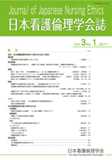Japanese
English
- 販売していません
- Abstract 文献概要
- 参考文献 Reference
- サイト内被引用 Cited by
医療の現実の中で、看護師が自身をよい・よくない看護師と思う体験とはどのようなものか? この問いを、経験半年~7年半の若手スタッフ11名へのインタビューによって探索した。全員が、患者に喜ばれた時によい看護師、患者に申し訳なく思った時はよくない看護師と思う体験をしていた。よい看護師体験のテーマは、喜びと振り返りからの学びであった。よくない看護師体験には、道徳的苦悩、道徳的不確か、道徳的後悔があり、頻度はより頻繁であった。背景には、多忙、医師の権力、難しい患者等が関与していたが、それらをよい仕事を阻む要因と認識する者はなく、自身のケアの未熟、気遣いの不足を悔いていた。よい・よくない看護師という認識には、患者の安寧という暗黙の願いが寄与していたが、その内的基準だけでは、看護師の辛い体験の十分な助けにはなっていなかった。
This study explored the question ‘How do nurses experience a good or a bad nurse in their every day practice?’ Eleven Japanese nurses with 0.5 to 7.5 years of clinical experience were interviewed. They found themselves to be a good nurse when they received appreciation from patients. Themes in their good nurse experiences included nurses' happiness and learning from self reflections on their behaviors. The nurses, however, more frequently experienced situations wherein they defined themselves as a bad nurse. Moral distress, uncertainty and regret were major factors in their bad nurse experiences with apparent underlying factors that included overwhelming workload, physician power and difficult patients. Not recognizing these factors as constraints for their good work, the nurses felt sorry for patients because of their professional immaturity and uncaring behaviors. Wish for patient's well-being, implicit in the nurses' narratives, contributed to their perspective of who a good or bad nurse was, however, this internal standard alone did not help nurses think through their distressing situations.
Copyright © 2011, The Japan Nursing Ethics Associatin. All rights reserved.


